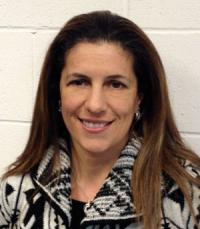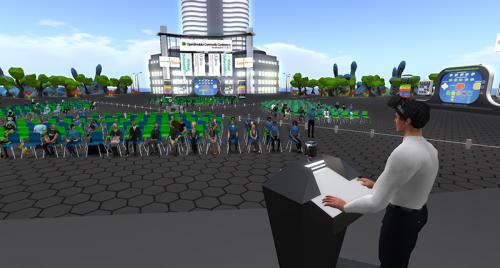The 2nd OpenSimulator Community Conference (OSCC’14)
Building on the success of last year’s conference, the 2nd OpenSimulator Community Conference took place on November 8-9. OSCC is an entirely virtual conference focusing on online virtual reality, and is hosted on an OpenSimulator virtual environment running on a server at UC Irvine. Attendance this year climbed to nearly 450 participants from multiple global timezones on Earth.
 ISR’s Prof. Crista Lopes is one of the main architects of OpenSimulator. This year’s conference was partially sponsored by UC Irvine’s Institute for Virtual Environments and Computer Games, and featured demos and posters showing UC Irvine’s research in virtual environments, including ISR Prof. Walt Scacchi’s projects.
ISR’s Prof. Crista Lopes is one of the main architects of OpenSimulator. This year’s conference was partially sponsored by UC Irvine’s Institute for Virtual Environments and Computer Games, and featured demos and posters showing UC Irvine’s research in virtual environments, including ISR Prof. Walt Scacchi’s projects.
ISR programmer analyst Kari Nies setup a number of computer game and virtual world applications that were designed by Scacchi, Nies, and UCI students, including online demonstrations of new interactive exhibitions and games for informal science education.
Scacchi noted, “OSCC is the premier global virtual world event that brings together hundreds of virtual world researchers and users, so it’s a key place for ISR R&D results to be seen by the virtual world community.”
The keynotes of this year’s conference were by OculusVR Principal Scientist Steve LaValle and former Linden Lab CEO Philip Rosedale. Prof. LaValle talked about the challenges of achieving truly immersive virtual reality with the Oculus Rift and beyond. Rosedale’s keynote was simultaneously broadcast to the virtual conference and to his new virtual platform High Fidelity. Besides the keynotes, the conference featured dozens of talks by members of the OpenSimulator community.
 According to Lopes, “With this level of participation and technical reliability, virtual conferences are starting to become serious contenders for holding meetings involving international communities. Granted, virtual conferences are not the same as physical conferences: there are some activities in physical conferences that cannot be reproduced in virtual environments. But the contrary is equally true: some features of virtual conferences cannot be reproduced in physical conferences.
According to Lopes, “With this level of participation and technical reliability, virtual conferences are starting to become serious contenders for holding meetings involving international communities. Granted, virtual conferences are not the same as physical conferences: there are some activities in physical conferences that cannot be reproduced in virtual environments. But the contrary is equally true: some features of virtual conferences cannot be reproduced in physical conferences.
“More important, however, is the cost for participants and for the environment. OSCC did not charge a registration fee, but even if it did, that would be the only expense for participants; there is no travel or lodging, which tend to be the main expenses when attending conferences. And, above all, the carbon footprint of OSCC’14 was a small fraction of what it would have been if the conference had been held in physical space.”
For more information about OSCC’14, visit the conference website:
http://conference.opensimulator.org/2014/
Archived videos of talks are available at:
http://www.ustream.tv/channel/oscc3 (main track; others at oscc2, oscc1, oscc4, and oscc5).



